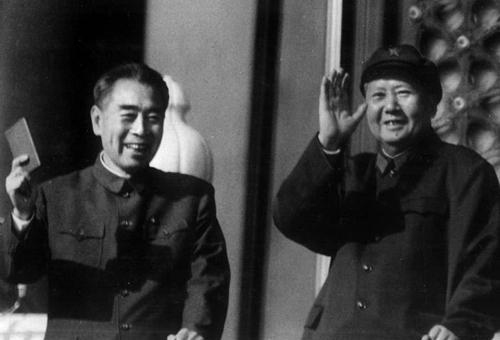On April 28, 1954, the Geneva Conference was held in Geneva, Switzerland, and the main discussion was on the settlement of the Korean issue and the Indochina issue. For China, this is an extremely important meeting, which is directly related to the improvement of the international environment and the improvement of the international status of New China. Therefore, the central authorities sent Premier Zhou Enlai to lead a Chinese delegation to attend the meeting.
The agenda of the meeting was very tight, and Premier Zhou's agenda for the past three months was all full. However, when Premier Zhou accidentally learned that a former international superstar was living in seclusion in a small town in Switzerland, he insisted that the staff reschedule him and make a day to visit the superstar and have a meal.

On the appointed day, Premier Zhou personally stood on the steps in front of the Huashan Villa waiting for the guests. Finally, a car stopped in front of the villa, and an old man with gray hair got out of the car. Premier Zhou stepped forward, held out a hand to the old man, and greeted him warmly in fluent English: "Hello, Mr. Chaplin! ”
Why does the international superstar who starred in a series of famous films such as "Gold Rush", "Modern Times", "The Great Dictator", "City Lights" and other famous films, which shaped the classic image of the tramp Charlotte, live in seclusion in such an almost isolated town?
It turned out that as Chaplin's reputation grew, he was isolated by his peers who were jealous of him. Many of Chaplin's films were taken down, some of his theatrical performances were forcibly cancelled, and his acting career was struggling. In addition, some of his works were too advanced in thought, which aroused the dissatisfaction of the reactionary forces in the United States. In desperation, Chaplin had to live in seclusion with his family in a small Swiss town, saying goodbye to his beloved stage.
Premier Zhou had long heard of this performing arts master and had always admired Chaplin's works, so he was determined to squeeze out time and seize this rare opportunity to meet Chaplin.
Chaplin had stayed in Shanghai for a while and forged a deep friendship with The Chinese performing arts master Mei Lanfang, but he had never come into contact with the Chinese Communists, let alone the senior leaders of the Ccp. Therefore, when he received the invitation from Premier Zhou, Chaplin, who was very sensitive to politics, was a little nervous.
However, Premier Zhou's amiable attitude and extraordinary charisma quickly dispelled Chaplin's concerns. When the two talked about "City Lights", which was vigorously banned by the Western literary and art circles, Premier Zhou gave full affirmation and praise to the film, which made Chaplin very moved. What could be more gratifying to an artist than if his work was affirmed by the audience?
The conversation between the two was not limited to the field of art, and Chaplin tentatively asked Premier Zhou about the Geneva Conference, and Premier Zhou calmed down and said in a relaxed tone: "Don't worry, everything has been resolved peacefully." Chaplin was a wise man, and immediately understood that Premier Zhou was thinking about him without telling him more details of the meeting. He grew up in England and lived in the United States for a long time, and when he heard the dispute between Britain and the United States for power and profit, his heart was naturally not comfortable.
He had earlier learned on the front page of the newspaper that Premier Zhou had shown extraordinary ability and strong personal charm during the meeting, and today he saw that it was extraordinary, and his heart was even more admired. Chaplin also asked about China's revolutionary course in the past few decades and the current situation in China, and after listening to Premier Zhou's brief description, he was greatly shocked and lamented the magnificent revolutionary process and the great changes in China. Premier Zhou invited Chaplin to come back to China when he had time, and Chaplin gladly agreed.
The two talked happily, and they didn't realize that it was lunchtime. Looking at the table full of Chinese food, Chaplin and his family were amazed and interested in each dish. During the meal, everyone kept raising glasses and wishing each other well, and Chaplin asked Premier Zhou if he could give him a bottle of Moutai wine, because the wine was so delicious. Premier Zhou laughed and replied, "No problem, you can send you a few bottles of this wine." After three rounds of drinking, Chaplin even got up and left the table to perform a Classic Charlotte "Duck Step" for the guests, which won the applause of the whole hall.
Chaplin has always been strict with his performances, rarely improvising in private, but today he has broken an example for a stranger. After the meal, Chaplin casually lamented that it was a pity that one of his children could not come to visit today for some reason and did not have the opportunity to taste such delicious and chic Chinese dishes. Premier Zhou immediately quietly instructed the staff to pack a small portion of the same Chinese dish as today's table and let Chaplin take it back to his children to taste.
On the occasion of parting, the two took a special photo to commemorate it.
Chaplin also gave his starring film "Stage Career" to Premier Zhou. After this meeting, Chaplin became more interested in Chinese culture. During the Geneva Conference, the Chinese delegation screened the Yue opera film "Liang Shanbo and Zhu Yingtai" in Switzerland, and it is said that Chaplin was moved to tears after seeing this "Romeo and Juliet of the East".